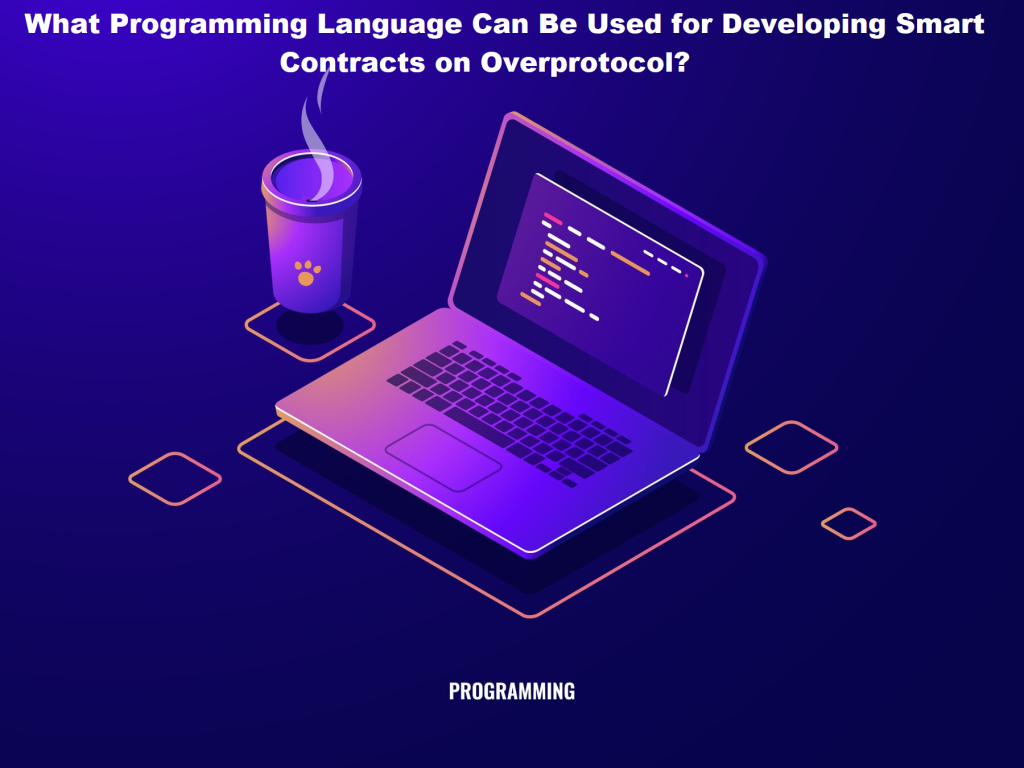What Programming Language Can Be Used for Developing Smart Contracts on Overprotocol?
In the realm of blockchain technology, smart contracts play a pivotal role in automating transactions and processes in a secure, transparent, and decentralized manner. OverProtocol, a rising star in the blockchain ecosystem, offers a robust platform for developing and deploying smart contracts. Understanding the programming languages suitable for developing smart contracts on OverProtocol is crucial for developers aiming to leverage this technology.

This article will delve into the various programming languages that can be used for developing smart contracts on OverProtocol, exploring their features, advantages, and how they integrate with the OverProtocol environment.
Understanding OverProtocol
Before we dive into the programming languages, it is essential to understand what OverProtocol is. OverProtocol is a blockchain platform designed to facilitate the creation and execution of smart contracts. It aims to provide a secure, scalable, and user-friendly environment for developers and businesses to build decentralized applications (dApps).
Why Smart Contracts?
Smart contracts are simply self-executing contracts where the terms of the agreement are directly written into different lines of code. They enable trusted transactions and agreements to be carried out among disparate, anonymous parties without the need for a central authority, legal system, or external enforcement mechanism.
Key benefits of smart contracts include:
- Automation: Transactions are automatically executed when predefined conditions are met.
- Transparency: All parties can see the contract terms and transaction history.
- Security: Smart contracts are encrypted and decentralized, reducing the risk of fraud and manipulation.
- Efficiency: By eliminating intermediaries, smart contracts streamline processes and reduce costs.
Programming Languages for Developing Smart Contracts on OverProtocol
OverProtocol supports multiple programming languages for smart contract development, each with its unique features and advantages. Here are the primary languages used:
1. Solidity
Overview
The term solidity is a high-level, statically-typed programming language which is designed specifically for writing smart contracts on the Ethereum blockchain. Given Ethereum’s prominence, Solidity has become one of the most popular languages for smart contract development and is widely supported by many blockchain platforms, including OverProtocol.
Features
- Statically Typed: Ensures type safety by requiring variable types to be declared.
- Object-Oriented: Supports inheritance, libraries, and user-defined types.
- Ethereum Virtual Machine (EVM) Compatible: Designed to run on the EVM, making it versatile for other EVM-compatible blockchains.
Advantages
- Wide Adoption: Extensive documentation, community support, and resources.
- Mature Tooling: Robust development tools such as Remix, Truffle, and Hardhat.
- Security: Built-in features to prevent common security vulnerabilities.
Use Case with OverProtocol
Solidity’s widespread use and compatibility with the EVM make it a natural choice for developers looking to build on OverProtocol. The extensive tooling and community support available for Solidity ensure that developers can quickly get up to speed and create secure, efficient smart contracts.
2. Vyper
Overview
Vyper is a Pythonic programming language designed for writing smart contracts. It aims to provide a more straightforward, secure, and readable alternative to Solidity. While still in its early stages compared to Solidity, Vyper is gaining traction due to its focus on simplicity and security.
Features
- Pythonic Syntax: Easy for Python developers to learn and use.
- Reduced Complexity: Minimalist design to improve code readability and security.
- Strong Typing: Enforces strict type checks to prevent errors.
Advantages
- Security Focus: Emphasizes security features to minimize vulnerabilities.
- Simplicity: Less complex syntax reduces the likelihood of coding errors.
- Auditability: More readable code makes auditing easier.
Use Case with OverProtocol
Vyper’s emphasis on security and simplicity makes it an attractive choice for developers who prioritize these aspects in their smart contracts. While it may lack some of the advanced features of Solidity, its design philosophy can lead to more secure and maintainable code, which is essential for critical applications on OverProtocol.
3. Rust
Overview
Rust is a systems programming language known for its performance, memory safety, and concurrency capabilities. It has gained popularity in the blockchain community for its efficiency and security features. Rust can be used for writing smart contracts on blockchains that support WebAssembly (Wasm), such as OverProtocol.
Features
- The Memory Safety: This simply guarantees memory safety without a garbage collector.
- Concurrency: Excellent support for concurrent programming.
- Performance: High-performance capabilities suitable for resource-intensive applications.
Advantages
- Safety: Prevents common bugs like null pointer dereferencing and buffer overflows.
- Performance: Ideal for performance-critical applications.
- Community Support: Growing community and ecosystem in the blockchain space.
Use Case with OverProtocol
Rust’s performance and safety features make it an excellent choice for developing high-performance, secure smart contracts on OverProtocol. Its compatibility with WebAssembly allows developers to leverage Rust’s capabilities in a blockchain environment, ensuring efficient and reliable smart contract execution.
4. Go (Golang)
Overview
Go, also referred to as Golang, is a statically typed, compiled programming language crafted for ease of use and high performance. It is widely used in cloud services, and its concurrency model makes it well-suited for blockchain applications. Go is supported by several blockchain platforms, including OverProtocol, particularly for writing chaincode.
Features
- The Concurrency: This is built-in support for concurrent programming with goroutines.
- Simplicity: Simple syntax and easy-to-read code.
- Performance: Efficient performance and fast execution times.
Advantages
- Ease of Use: Simple syntax and strong standard library.
- Concurrency: Excellent for developing scalable, concurrent applications.
- Ecosystem: Extensive libraries and frameworks for blockchain development.
Use Case with OverProtocol
Go’s simplicity and efficiency make it a strong candidate for developing smart contracts and other blockchain applications on OverProtocol. Its robust concurrency model and performance capabilities are particularly beneficial for building scalable and responsive blockchain solutions.
5. JavaScript
Overview
JavaScript, a versatile and widely-used programming language for web development, has found its way into the blockchain space through frameworks like Node.js. While not traditionally associated with smart contract development, JavaScript can be used in conjunction with blockchain platforms that support WebAssembly (Wasm), such as OverProtocol.
Features
- Event-Driven: Excellent for asynchronous programming and event-driven architectures.
- Versatility: Can be used for both front-end and back-end development.
- Large Ecosystem: Extensive libraries and frameworks available.
Advantages
- Accessibility: Familiar to many developers, reducing the learning curve.
- Versatility: Can be used for full-stack development, including blockchain.
- Community Support: Massive community and a wealth of resources.
Use Case with OverProtocol
JavaScript’s versatility and widespread adoption make it a practical choice for integrating blockchain functionality with web applications on OverProtocol. While it may not be the primary language for writing smart contracts, it is valuable for building user interfaces and interacting with blockchain APIs.
Conclusion
The choice of programming language for developing smart contracts on OverProtocol depends on various factors, including the developer’s expertise, the specific requirements of the application, and the desired balance between performance, security, and ease of use. Solidity, Vyper, Rust, Go, and JavaScript each offer unique advantages and are well-suited to different aspects of blockchain development.
Solidity remains the go-to language for many due to its extensive adoption and mature tooling. Vyper appeals to those prioritizing simplicity and security, while Rust offers unparalleled performance and safety features. Go’s concurrency model and efficiency make it a strong candidate for scalable applications, and JavaScript’s versatility ensures seamless integration with web technologies.
By understanding the strengths and use cases of these programming languages, developers can make informed decisions when building smart contracts on OverProtocol, leveraging the platform’s robust capabilities to create secure, efficient, and innovative blockchain solutions.


